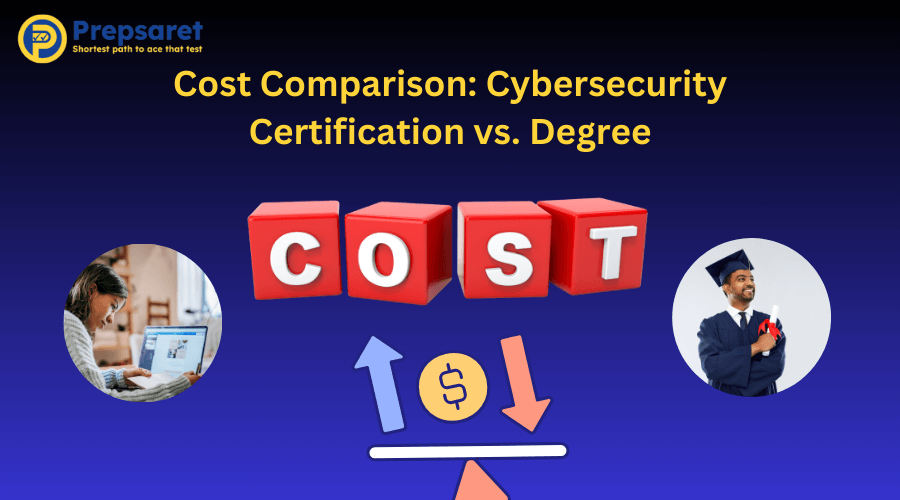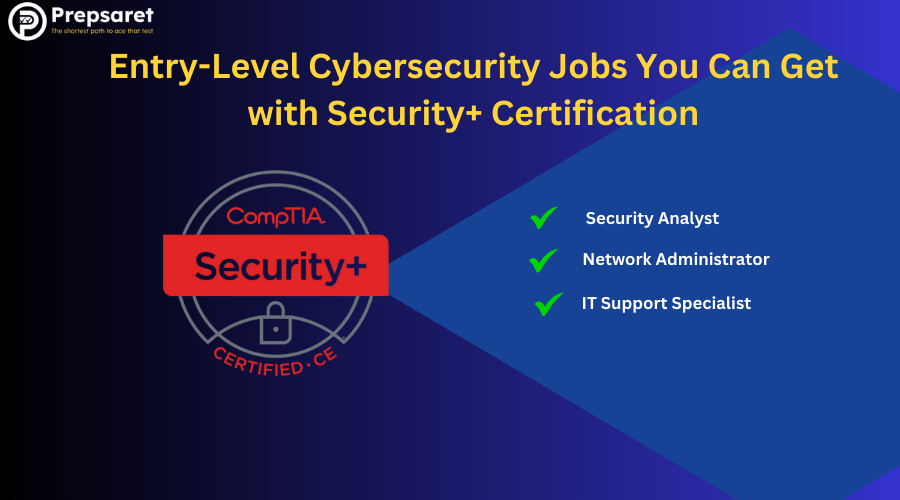Cybersecurity Certification vs. Degree
In today’s digital world, cybersecurity professionals are the unsung heroes keeping our data safe from hackers, cybercriminals, and digital disasters.
But if you’re considering a career in cybersecurity, you’ve probably asked yourself: Should I get a cybersecurity certification or pursue a degree?
Both paths can lead to a rewarding career, but they differ in cost, time commitment, and career impact.
Online discussions, such as those on Cybersecurity certification vs degree Reddit, highlight this debate, with professionals weighing in on salary expectations, career growth, and job prospects.
Let’s break it down and help you decide which option best fits your goals and Prepsaret can help you attain it.
Key Differences Between a Cybersecurity Certification and a Degree
| Feature | Certification | Degree |
| Duration | Weeks to months | 2-4 years |
| Cost | A few hundred to a few thousand dollars | $20,000 – $100,000+ |
| Curriculum | Focused on specific skills and tools | Broad education in cybersecurity principles |
| Industry Recognition | Highly valued for specific roles | More comprehensive and valued in leadership roles |
| Career Impact | Quick entry into the field | Long-term growth and leadership opportunities |
Understanding Cybersecurity Certifications: Overview and Benefits
Cybersecurity certifications validate your skills and knowledge in specific areas. They’re great for those looking to enter the field quickly or boost their resume.
Some professionals debate between a cybersecurity certification vs degree online, especially when considering flexible learning options.
Benefits of Cybersecurity Certifications
- Faster to complete than a degree
- Cost-effective
- Industry-recognized and vendor-specific options available
- Ideal for career changers and professionals looking to upskill
Who Should Consider a Certification?
- IT professionals looking to pivot into cybersecurity
- Those wanting a quick path to entry-level jobs
- Professionals seeking specialized certifications in cybersecurity.
Related blog post: Best Cybersecurity Certification for IT Professionals
Identify and Describe Three Cybersecurity Certifications That Are Highly Valued by Employers
Beyond CompTIA Security+, which is a common entry point, several other certifications are highly valued by employers:
- Certified Information Systems Security Professional (CISSP) – A globally recognized certification for experienced professionals focusing on security management and governance.
- Certified Ethical Hacker (CEH) – Ideal for professionals interested in penetration testing and ethical hacking.
- Google Cybersecurity Certification – A newer option that provides foundational security knowledge and practical training for entry-level cybersecurity roles.
What Is a Cybersecurity Degree? Academic Path and Career Impact
A bachelor’s degree in cybersecurity provides an in-depth education in security principles, network defense, risk management, and more. Some professionals continue their education by earning a master’s degree in cybersecurity, which opens doors to leadership roles.
What to Expect from a Cybersecurity Degree
- A structured curriculum covering programming, cryptography, risk assessment, and compliance
- Opportunities for internships and research projects
- A strong foundation for leadership, management, and cybersecurity career paths
How a Degree Impacts Career Growth
- More opportunities for mid-level and senior roles
- Preferred for government, corporate, and managerial positions
- Helps with long-term career stability and higher earning potential
Cybersecurity Certificate Salary vs. Degree Salary
Many professionals wonder about cybersecurity certification vs degree salary differences. Salaries vary depending on certification, experience, and degree level:
- Entry-level roles with a certification (e.g., Security+): $60,000 – $80,000 per year
- Mid-level roles with a CISSP certification: $90,000 – $130,000 per year
- Bachelor’s degree holders: $70,000 – $110,000 per year, depending on experience
- Master’s degree holders: $100,000+ per year, especially in leadership positions
According to discussions on Cybersecurity certification vs degree Reddit, professionals with certifications often enter the field quickly, while degree holders have stronger long-term earning potential.
Read on: Cybersecurity Analyst Salary
IT Certifications for Cybersecurity: Other Training Options
If you’re looking to expand your skills, many cybersecurity training programs offer vendor-neutral and vendor-specific certifications, such as:
- Cisco Certified CyberOps Associate – Ideal for security operations roles
- GIAC Security Essentials (GSEC) – Covers hands-on security skills
- Microsoft Certified: Security, Compliance, and Identity Fundamentals – Focuses on cloud security and compliance
Cost Comparison: Cybersecurity Certification vs. Degree

Let’s talk money. Whether you’re considering a cybersecurity degree or certifications Reddit discussion suggests weighing the financial investment against potential salary gains.
Tuition Fees vs. Certification Costs
- Cybersecurity Degree: A traditional bachelor’s degree in cybersecurity can cost anywhere from $20,000 to $100,000.
- Certifications: A CompTIA Security+ certification costs about $392. The CISSP certification costs $749 but is still significantly cheaper than a degree.
Continue reading: Cybersecurity Courses
Return on Investment (ROI)
- Degree ROI: A cybersecurity degree takes longer but can open doors to cybersecurity career paths in management and specialized fields.
- Certification ROI: Certifications are faster and cheaper, helping professionals secure jobs more quickly.
Job Market Demand: Do Employers Prefer Cybersecurity Certifications or Degrees?
The job market is evolving, and cybersecurity employers aren’t just looking at degrees anymore. Let’s explore hiring trends.
What Do Employers Really Want?
Entry-Level Jobs
Many hiring managers prioritize cybersecurity certifications over degrees, especially for technical roles. Certifications like CompTIA Security+ or CEH provide the practical skills needed for entry-level jobs in cybersecurity, such as Security Analyst or Network Administrator.
Mid-to-Senior Roles
Degrees may be preferred for managerial positions but are not always required. Career growth with a cybersecurity certification or degree depends on experience, specialized skills, and professional development.
Advanced roles often require advanced cybersecurity certifications, such as CISSP or CISM, to demonstrate expertise.
Government Jobs
Some federal positions require degrees, while others accept equivalent experience plus certifications. Many government cybersecurity roles specify cybersecurity analyst qualifications that combine both educational credentials and industry-recognized certifications.
Check this out: CompTIA Security+ Test Prep
Entry-Level Cybersecurity Jobs You Can Get with Security+ Certification

If you’re looking to break into cybersecurity without a degree, getting CompTIA Security+ certified is a great move. Here are some jobs you can land with this cert:
Security Analyst
Analyzes security threats and protects an organization’s network.
- Average salary: $70,000–$90,000 per year.
Network Administrator
Manages and secures an organization’s network infrastructure.
- Average salary: $60,000–$85,000 per year.
IT Support Specialist
Provides tech support, troubleshooting, and security assistance.
- Average salary: $50,000–$75,000 per year.
These roles provide a strong foundation for professionals looking to advance with online cybersecurity programs that allow for further skill development.
Are Employers Moving Toward Certification-Based Hiring in Cybersecurity?
Absolutely! More companies are adopting a skills-based hiring approach, focusing on what you can do rather than what degree you have.
Why the Shift?
- Cyber threats are evolving rapidly—employers need professionals with up-to-date skills.
- Cybersecurity certifications prove hands-on knowledge, whereas degrees focus more on theory.
- Many tech giants (Google, IBM, etc.) are removing degree requirements for cybersecurity jobs.
Time Commitment: How Long Does It Take to Earn a Certification vs. a Degree?
Time required for cybersecurity certifications vs degrees varies significantly, impacting career entry speed.
Certification Timeline
- CompTIA Security+: Study time 1–3 months, exam in 90 minutes.
- CISSP: Requires 5 years of experience but the exam takes 4 hours.
- Certified Ethical Hacker (CEH): Study time 3–6 months, exam in 4 hours.
Degree Timeline
- Associate Degree: 2 years.
- Bachelor’s Degree: 4 years.
- Master’s Degree: 1–2 additional years.
Certifications allow for a faster entry into the workforce, while degrees provide a broader knowledge base for long-term growth.
Cost Comparison: Cybersecurity Certifications vs. Degrees
Cost comparison between cybersecurity certificates and degrees is an essential factor for career decision-making.
- Certifications: Cost between $300–$1,500 per exam.
- Degrees: Tuition can range from $10,000–$50,000+ per year, depending on the institution.
For individuals seeking a budget-friendly entry into cybersecurity, certifications are a cost-effective alternative to traditional degree programs.
Skills Acquired: What You Learn from a Cybersecurity Certification vs. a Degree
Certifications:
- Focus on specific skills, like ethical hacking, network security, or cloud security.
- Offer hands-on experience through labs, simulations, and real-world scenarios.
- Ideal for professionals looking to upskill quickly and land a job fast.
Degree Programs:
- Provide a broad, in-depth foundation in cybersecurity, networking, and computer science.
- Cover theoretical concepts, risk management, and security policies.
- Great for those who want to understand cybersecurity from multiple angles and possibly move into leadership roles.
Bottom line: Certifications help you gain specialized, hands-on skills fast, while degrees give you a solid theoretical foundation for long-term career growth.
Salary Potential: Does a Certification or Degree Lead to Higher Pay?
Salary expectations for cybersecurity professionals depend on experience, education, and industry demand.
Cybersecurity Certification Salaries
- Entry-level professionals with certifications (like CompTIA Security+ or Certified Ethical Hacker) can expect to earn $60,000 – $90,000 per year.
- Experienced professionals with top-tier certifications (like CISSP) can make $100,000+ annually.
Cybersecurity Degree Salaries
- A bachelor’s degree in cybersecurity or computer science typically leads to salaries between $70,000 – $110,000.
- With a master’s degree, salaries can jump to $120,000+, especially for management or specialized roles.
Factors That Affect Salary
- Experience: More experience = higher pay, whether you have a certification or degree.
- Location: Cybersecurity salaries are higher in tech hubs like San Francisco, New York, and Washington, D.C.
- Industry Demand: Finance, healthcare, and government sectors often pay cybersecurity professionals top dollar.
Bottom line: Degrees can lead to higher earning potential in the long run, but certifications can get you into the field quickly with competitive salaries.
Learn more: Cybersecurity Salary
Choosing the Best Cybersecurity Path: Certification, Degree, or Both?

So, how do you decide? Ask yourself these questions:
Go for a Cybersecurity Certification if:
- You want to break into cybersecurity quickly.
- You prefer hands-on learning and practical skills.
- You’re looking for a cost-effective way to boost your resume.
Go for a Cybersecurity Degree if:
- You want a deep, well-rounded education in cybersecurity and IT.
- You’re aiming for leadership, research, or specialized roles.
- You have the time and resources to invest in a degree program.
Do Both if:
- You want the best of both worlds—deep knowledge + practical skills.
- You’re looking to stand out in a competitive job market.
- You’re aiming for top-paying jobs that require both education and certifications.
Final Thoughts: Which Path Is Right for You?
The best choice between cybersecurity certifications and degrees depends on your career goals, budget, and timeline. Certifications provide fast, skill-focused training, while degrees offer a broader educational foundation.
Many professionals find success by combining both, maximizing their qualifications and career growth potential.
- If you want a fast entry into cybersecurity, go for certifications
- If you seek long-term growth in leadership, a bachelor’s degree in cybersecurity or even a master’s degree in cybersecurity may be better
- If you’re still unsure, consider both—many professionals start with IT certifications for cybersecurity and later pursue a degree
Regardless of your choice, both paths offer excellent opportunities in cybersecurity. The key is to align your decision with your career goals and financial situation.
FAQs
Can You Get A Cybersecurity Job With Just A Certificate?
Yes, you can get entry-level cybersecurity jobs with a certificate. Roles like security analyst or IT technician are accessible. However, higher-level positions often require a degree or advanced certifications.
Is It Better To Have A Certificate Or Degree In It?
The choice between a certificate and a degree depends on your goals. Certificates are faster and cheaper, ideal for specific skills. Degrees take longer but provide broader knowledge and better prospects for leadership or management roles.
Is A Cybersecurity Degree Enough To Get A Job?
A cybersecurity degree is often sufficient for entry-level positions. However, additional certifications can enhance employability and specialization in advanced roles. Practical experience and continuous learning are also crucial in this rapidly evolving field.
Which Certificate Is Best For Cyber Security?
The best cybersecurity certificates include CISSP, CISA, CEH, Security+, and SSCP. These credentials cater to various expertise levels and are highly valued by employers.
Each certificate targets different aspects of cybersecurity, such as management, ethical hacking, or entry-level security roles.

